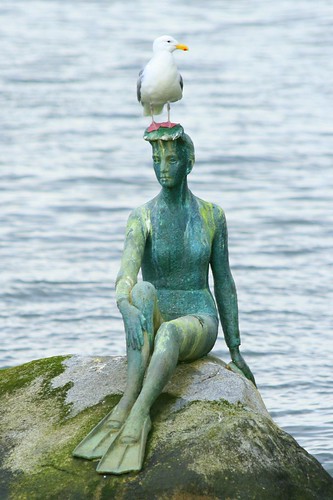Vancouver's answer to Copenhagen's Little Mermaid landmark is Elek Imredy's statue of a "Girl in a Wetsuit". This sculpture was erected on 9 June 1972 in Burrard Inlet, just off the shore of Stanley Park, Vancouver, British Columbia. Unable to obtain permission to reproduce Copenhagen's Little Mermaid statue, the Canadian city commissioned a modern version with diving mask, wet suit, and swim fins. No snorkel, though! According to the sculptor's wife, Peggy Imredy, "She represents Vancouver's dependence on the sea and the necessity to use the sea for the benefit of all."
I wonder whether "Girl in a Wetsuit" is the world's only monument to snorkelling. I don't expect you'd find anything similar in all those tropical resorts which infrequent snorkellers believe are the only venues for their pursuit. Warm water and coral reefs have indeed become the
sine qua non of many of today's pampered snorkellers. In the process, they forget the expense, both monetary and environmental, involved in flying off to remote "beauty spots" where snorkelling and diving are the only offerings, leaving much to be desired in the way of
après-plongée. These destinations are seldom known for their historical or cultural interest, or even for their retail therapy. The people who live all the year round in these tropical paradises are often totally dependent on the tourist dollar, which can be an unreliable source of income which pays low wages and can breed resentment at the economic inequality between the residents and the visitors.
So I think the "why" question must be posed as well to my fellow Britons who leave the beautiful sandy shores of the United Kingdom to fly to the Red Sea, the Indian Ocean or the Caribbean. The flora and fauna there may be more photogenic and the water temperature may be higher, but nobody but millionaires could afford to live and snorkel there all the year round. I live 8 miles away from the North Sea and I snorkel in it most months of the year, while enjoying all the non-snorkelling benefits my North East of England home town offers. It's inexpensive, the car ride is short with plenty of wildlife to see on the way to the coast, including foxes, swans and seagulls. When I get to the seaside I don my vintage-style drysuit to keep warm and swim out clad in my traditional full foot fins and mask, not dissimilar to those in the Stanley Park statue, and I'm happy doing my favourite pastime, in the same way as I've done it for the last fifty years. Coral reefs and tropical fish? Just a bonus. The main point of snorkelling is to enjoy open-water swimming with the occasional dip down to the depths, to experience one-ness with the aquatic environment, to refresh ourselves at the beginning of the day, to relax, to exercise, to enjoy just being alive...
As for British Columbia, what a wonderful place to choose as a snorkelling venue. I visited BC in the mid-1990s when I attended, and presented a paper at, an international summer conference at the University of Victoria on Vancouver Island. The ferry trip was fantastic, I saw some of the most beautiful land and marine scenery in the world. If I ever go back, I will certainly bring my favourite snorkelling gear with me. I spent a few days after the conference in the city of Vancouver and noted how many diving, surfing and snorkelling stores the city had. When snorkelling began as a pursuit for the masses in the late 1950s, I expect the venue of choice would have been spots at no great distance from where we live. There's every reason why this should be the case again, considering how air travel is getting more and more expensive and uncomfortable, while the upside of global warming is that the temperate seas of the world are getting warmer and more welcoming to snorkellers. On second thoughts, though, I don't want all those British crowds currently frequenting Sharm el Sheikh in Egypt to invade my own little temperate paradise in the North East of England.





